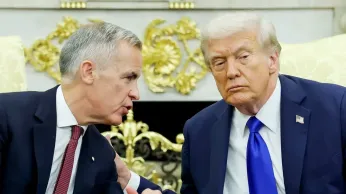
4 hours ago
Trump Mocks Trans People in Oval Office Meeting with Canadian Prime Minister Mark Carney, Whose Child Is Nonbinary
READ TIME: 3 MIN.
On Tuesday, October 7, 2025, Canadian Prime Minister Mark Carney met with U.S. President Donald Trump in the Oval Office for a meeting ostensibly focused on resolving trade disputes between the two countries. While the leaders exchanged pleasantries—Carney even joked, “I wore red for you,” prompting laughter—the tone quickly shifted when Trump veered off-topic to attack transgender rights and denigrate the Democratic Party as “woke cr*p”.
Trump, who has made opposition to transgender rights a centerpiece of his political platform, used the occasion to highlight his administration’s anti-trans policies, including executive orders restricting transgender participation in sports and access to gender-affirming care for minors. “We have strong borders. We have no men in women’s sports. We’re not going to take your child away and change the sex of your child,” Trump said, according to reporters present. He also framed Democrats as “insurrectionists” and claimed they lacked substantive policies beyond what he termed “woke” initiatives.
Prime Minister Carney, who took office in March 2025 after leading Canada’s center-left Liberal Party to a federal election victory, is a known advocate for LGBTQ+ rights and has previously stated that a “great strength of Canada is that people can be who they are, they can love who they love, they can live where they are”. Notably, Carney is also the parent of a nonbinary child, adding a personal dimension to the encounter that was not lost on observers.
Throughout Trump’s remarks, Carney remained silent, offering no visible reaction to the president’s comments. His reserved demeanor stood in stark contrast to Trump’s combative rhetoric, reflecting both diplomatic protocol and the sensitive nature of the exchange. No official statement from the Prime Minister’s Office regarding the incident had been released as of publication.
The Oval Office meeting took place amid heightened tensions between the U.S. and Canada, fueled by Trump’s imposition of steep tariffs on Canadian exports—including a 25% levy on all products set to rise to 35%, and even higher tariffs on metals and automobiles. Trump has repeatedly suggested that Canada should become the “51st state” of the U.S., a proposal he reiterated during the meeting, reportedly joking about a potential “U.S.-Canada merger” that caught both Carney and reporters off guard.
Despite the levity, the underlying issues were serious: Carney faced mounting pressure at home to secure relief from U.S. tariffs and demonstrate progress in bilateral relations. Trump, for his part, praised Carney as a “world-class leader” and a “tough negotiator,” but also quipped that trade talks remain unsettled because “I want to be great, too”.
The incident has drawn sharp criticism from LGBTQ+ advocates and political observers, who view Trump’s remarks as part of a broader pattern of stigmatizing transgender people for political gain. Advocacy groups emphasize that such rhetoric from a world leader not only undermines the dignity of transgender individuals but also risks legitimizing discrimination and violence against them.
Carney’s silence during the exchange has sparked debate. Some argue that his restraint was a necessary act of diplomacy in a high-stakes meeting, while others believe a stronger response was warranted given his personal and political commitments to LGBTQ+ rights.
Trump’s return to the White House for a second term has been marked by a series of executive actions targeting transgender rights, including restrictions on healthcare access, military service, and participation in sports. These policies have drawn condemnation from human rights organizations and have been a flashpoint in U.S. domestic politics.
In contrast, Canada under Carney’s leadership has sought to position itself as a global leader on LGBTQ+ inclusion. Carney’s public support for transgender and nonbinary individuals, including his own child, reflects a broader shift in Canadian society toward greater acceptance and legal protections for LGBTQ+ people. The clash between these two approaches was on full display during the Oval Office meeting.
The encounter raises questions about the future of U.S.-Canada relations under the current administrations. While both leaders expressed a desire to strengthen cooperation, the stark differences in their social and political priorities—especially on issues of human rights and inclusion—suggest that significant challenges lie ahead.
For now, the incident serves as a reminder of the enduring cultural and political divides between the two North American neighbors, as well as the personal stakes for leaders navigating these tensions in an increasingly polarized global landscape.






